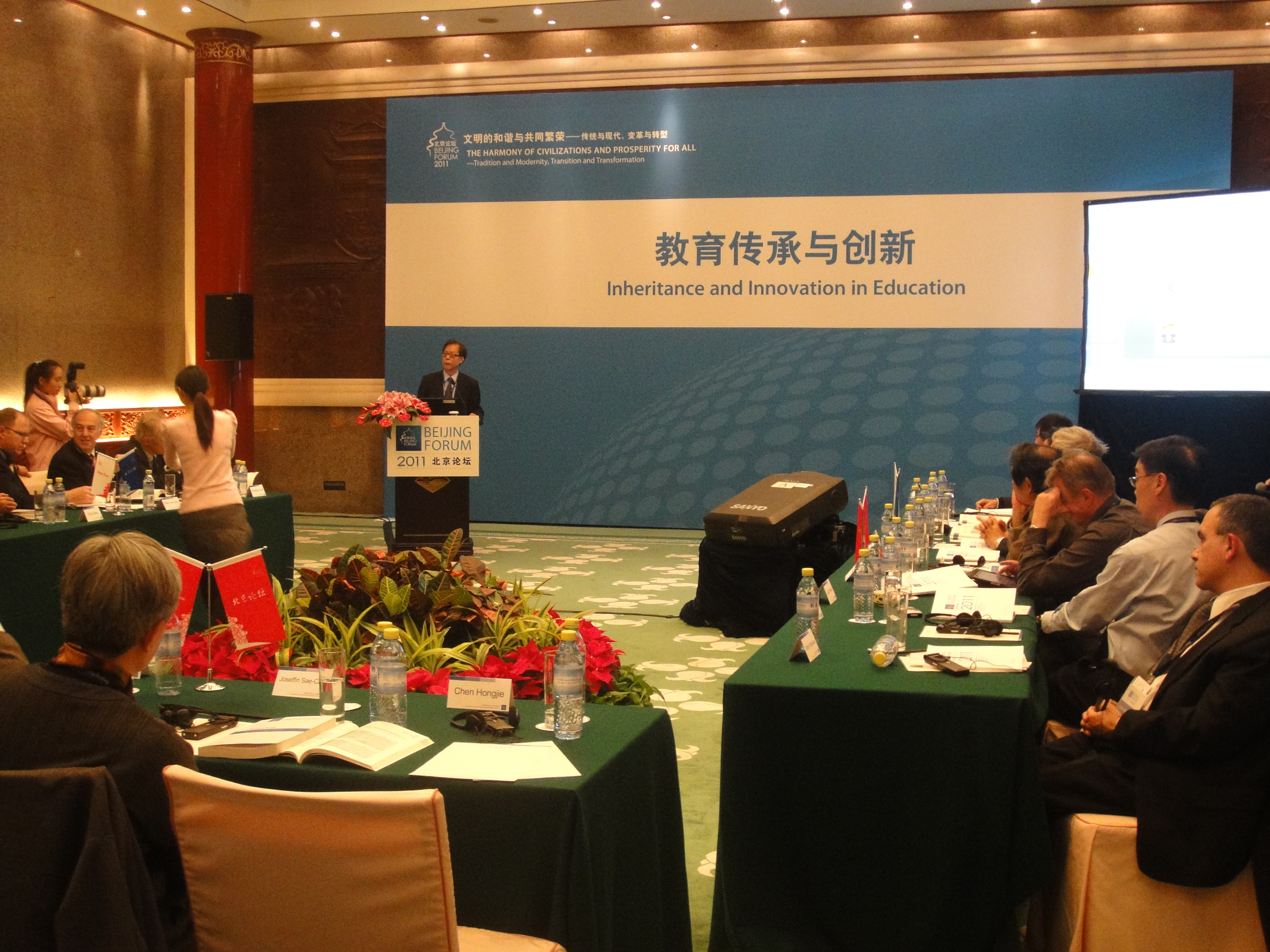Peking University, Nov. 9, 2011: The Education Panel of Beijing Forum (2011) debuted at the Diaoyutai State Guesthouse in Beijing on the afternoon of November 4. The theme of the Education Panel this year was “Inheritance and Innovation in Education”. The discussed issues covered the development of the future education, the advanced tool that should be used to improve education, the effort needed to help the children in less developed countries and regions and so on.

Professor Chen Xiangming and Jia Jiyou from Peking University Graduate School of Education chaired the session on November 4. In the first half, Christopher Wulf, professor of FU Berlin; John Hearn, vice president of Sydney University; James W. Jacob, professor of Pittsburgh University and Ding Gang, professor of East China Normal University made speeches addressing the challenges and opportunities of education in the process of globalization.
Professor Christopher Wulf pointed out that human beings are confronted with three main contradictions in the process of globalization, namely violence and peace, universal standardization of the world and cultural diversity, environment crisis and sustainable development. Therefore, three key factors should be considered in the face of the future education: peace, cultural diversity and sustainability.
Professor John Hearn then turned to emphasize on how to solve the problems we are all concerned about. He introduced four challenges that all human beings around the globe are faced with, including global climate change and food security, understanding cultures, globalization of higher education and research, and public health issues. Hence, in the reforms of all aspects of higher education to better address those challenges, it is vital to build partnerships among universities and strengthen international communication.
Professor James Jacob moved on to point out four key organizational elements of higher education institutions, which are strategy, culture, technology and structure. In his opinion, only by understanding these four aspects and making changes according to them can Chinese higher education improve itself in the future.
Professor Ding Gang gave a speech about the traditional Classical Academy of the “May Fourth movement”, exploring the relationship between Classical Academy spirit and Western culture. He mentioned Cai Yuanpei and Hu Shi as two typical examples in the reform of universal academy in universities, as well as Mao Zedong’s establishment of Hunan Self-Study School, which reflects a change orientation of nationalization.
In the process of discussion, the collision between Chinese and Western culture has brought about wonderful sparks, especially in exchanges of the different ideas of education. Western education is deeply rooted in the ancient Greek tradition which stressed the importance of individual value, while Chinese culture is still affected by Confucius philosophy which pays more attention to the value of society. The difference in the origins of education between western countries and China may be huge, but from this difference we can draw lessons and learn from each other, which would help us find better ways to improve contemporary and future education.
The second half of forum focused on Information and Communication Technology and educational creativity development. Another four professors gave brilliant lectures on this topic.
Wang Zhuzhu, curator of the Chinese National Center for Educational Technology, stressed the significance of using Information and Communication Technology (ICT) in the process of education. She pointed out that there were three periods of teachers’ attitude and behavior towards ICT applicants: the first, from suspicion whether they could use them to try to use them; the second, from try to use them to ask if it is easy to use them; the third, from apply ICT consciously to use ICT unconsciously. She believed that ten years from now, pedagogical ICT development would focus on broad band, ubiquitous using, and intelligence.
Chinese University of Hong Kong Professor Lee Fong-Lok talked about the traditional conception of Chinese teachers and parents, “reward comes from diligence, but nothing is gained by indolence”. He held that this conception was challenged by the progress and innovation of technology in modern times. He divided learning methods into two different categories: surface learning and deep learning, and he compared the differences of the two and efforts of Eastern and Western countries.
Ms. Lata Menon from China office of UNICEF gave a speech named “Innovations in Education-Child Focused Equity Analysis Tools”. In her speech she presented facts and problems we need to tackle in providing equal education opportunity to all children. According to the surveys of 26 countries, the equity of different countries’ education situation is not optimistic. The gap among the richest and poorest children, among regions and within countries is growing. What we need to do immediately is to explore analysis tools on educational equality to help these children, especially those in developing countries. The main difficulty that we face now is how to find other organizations to carry part of the responsibility and whether they have enough money and tools to do it.
At last, University of London Professor Tim Unwin talked about the challenges of learning in a digital world. He explored the intersection of these changes with the increased use of ICTs in higher education, focusing particularly on Open Education Resources, Learning/Content Management Systems and Mobile Learning. He appealed people to think about the traditional value of universities and to support the use of ICT.
The Educational Panel has established a platform of academic communication, upon which scholars from around the world can exchange their knowledge and understanding of traditional culture, and try to find the proper way for the future development of modern education from there.
Reported by: XuYang
Edited by: Li Xiaomeng